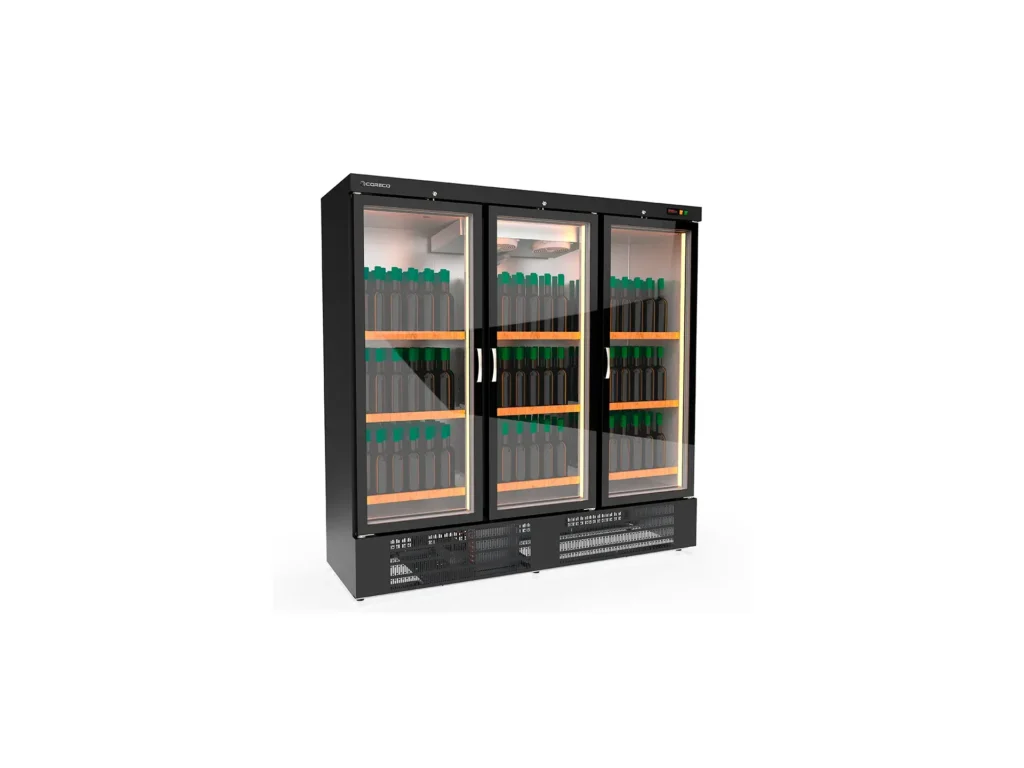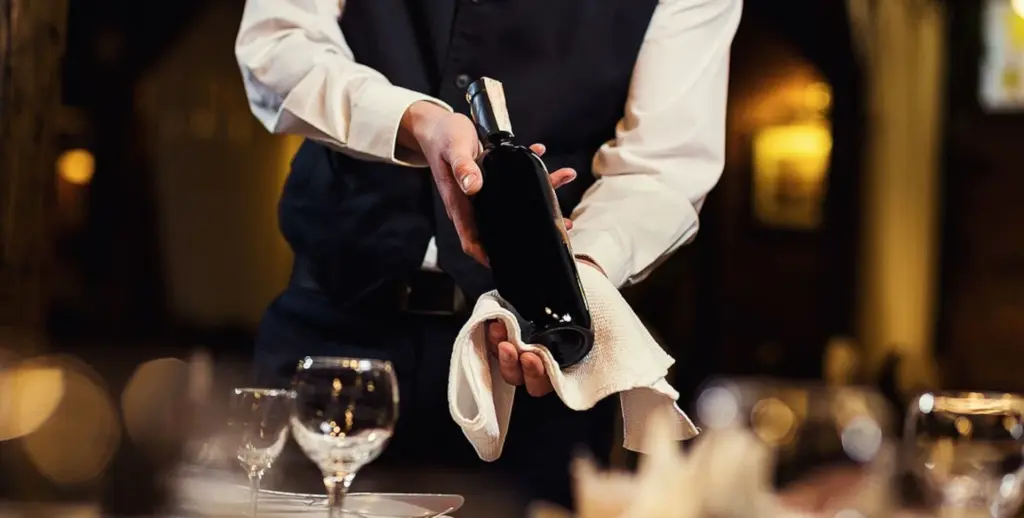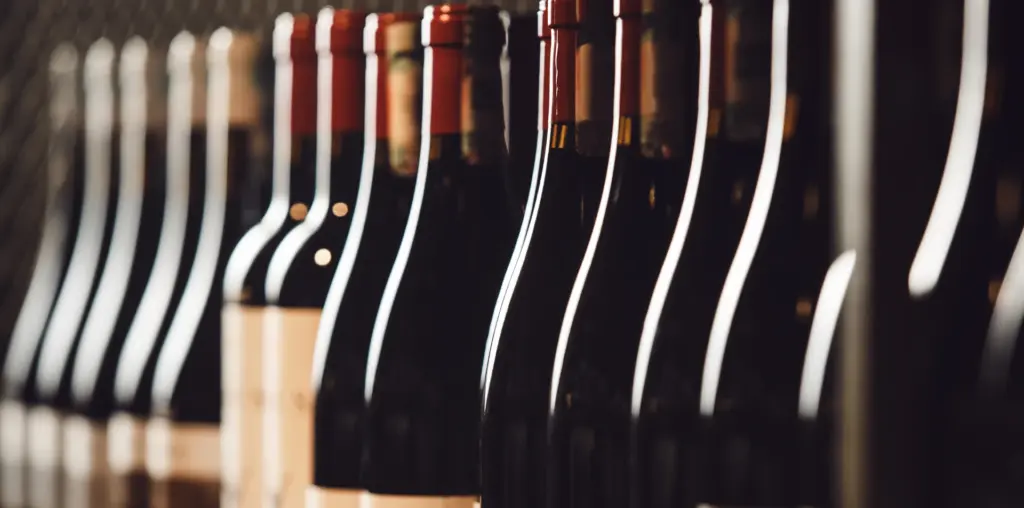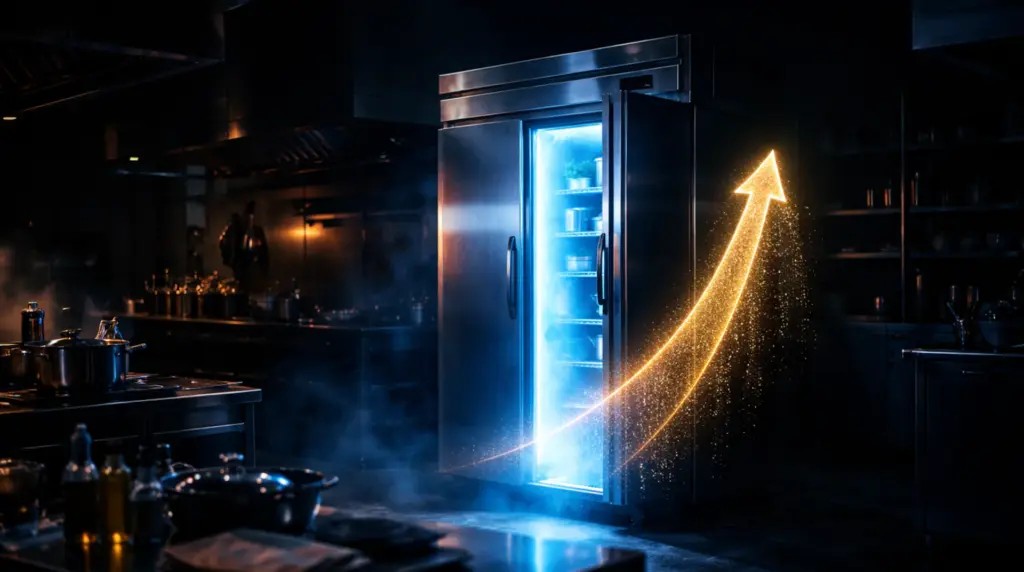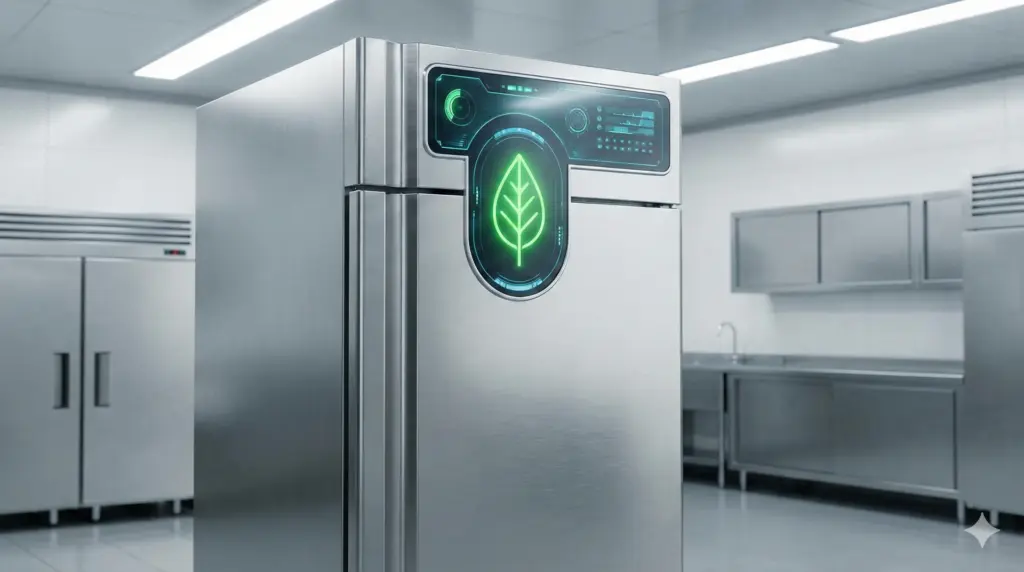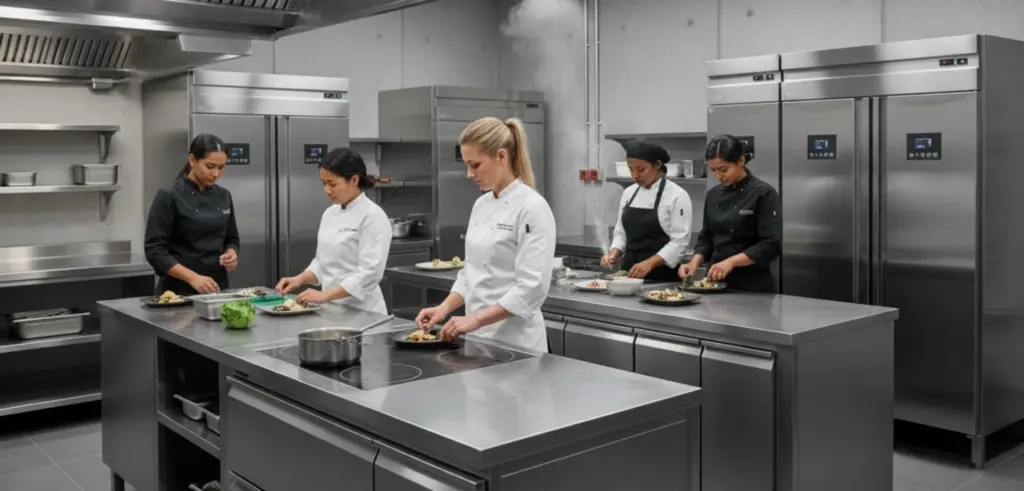Wine preservation in refrigerated cellars
Welcome to our detailed guide to wine preservation and refrigeration, designed especially for HORECA customers. At Coreco, we understand the importance of maintaining the quality and taste of wine, and we want to share with you the best practices and technological solutions to achieve this.
The importance of wine preservation in refrigerated cellars
Wine is a delicate product whose quality can be affected by various environmental factors. Proper storage not only preserves its original properties, but also enhances its flavour and complexity over time.
Key factors for wine storage in coolers
The preservation of wine bottles in refrigerated cellars or coolers is ideal for several reasons, all related to the preservation of the quality and characteristics of the wine:
- Constant temperatureWine is very sensitive to temperature changes. Sudden variations can deteriorate its taste and aroma. A refrigerated cellar maintains a constant temperature, generally between 12 and 16 degrees Celsius, depending on the type of wine, but they are considered ideal for various ranges of conservation.
- Adequate humidityHumidity is also an important factor in wine preservation. Too dry an environment can cause corks to dry out and shrink, allowing air to enter and oxidise the wine. A refrigerated cellar maintains a controlled humidity level, usually around 70%, which helps to keep the corks in good condition.
- Light protectionLight, especially sunlight, can degrade wine, affecting its chemical components and altering its taste. Wine cellars are designed to protect the bottles from exposure to light, often with tinted glass doors that filter out UV rays.
- Minimal vibrationsVibrations can agitate the wine and accelerate unwanted chemical reactions. Refrigerated wine cellars are designed to minimise vibrations, providing a quiet and stable environment for the bottles.
- PositioningWine cellars allow the bottles to be stored horizontally, which is important to keep the cork moist and expanded, preventing the entry of air and the oxidation of the wine.
- Odour controlWine cellars are designed to prevent the absorption of external odours that can contaminate the wine, which can occur if stored in ordinary refrigerators with other foodstuffs.
- Ideal temperatureThe storage temperature should be kept constant between 12-13°C. Sudden variations can accelerate the ageing of the wine.
- Relative humidityHigh relative humidity, between 60-90%, is essential to keep the corks moist and prevent wine evaporation.
Select refrigerated wine cellars
The refrigeration units must be capable of maintaining a stable temperature between 5-18°C and a relative humidity of 60-95%. It is essential that these units are specifically designed for wine preservation, considering the geographical location and the cooling capacity required.
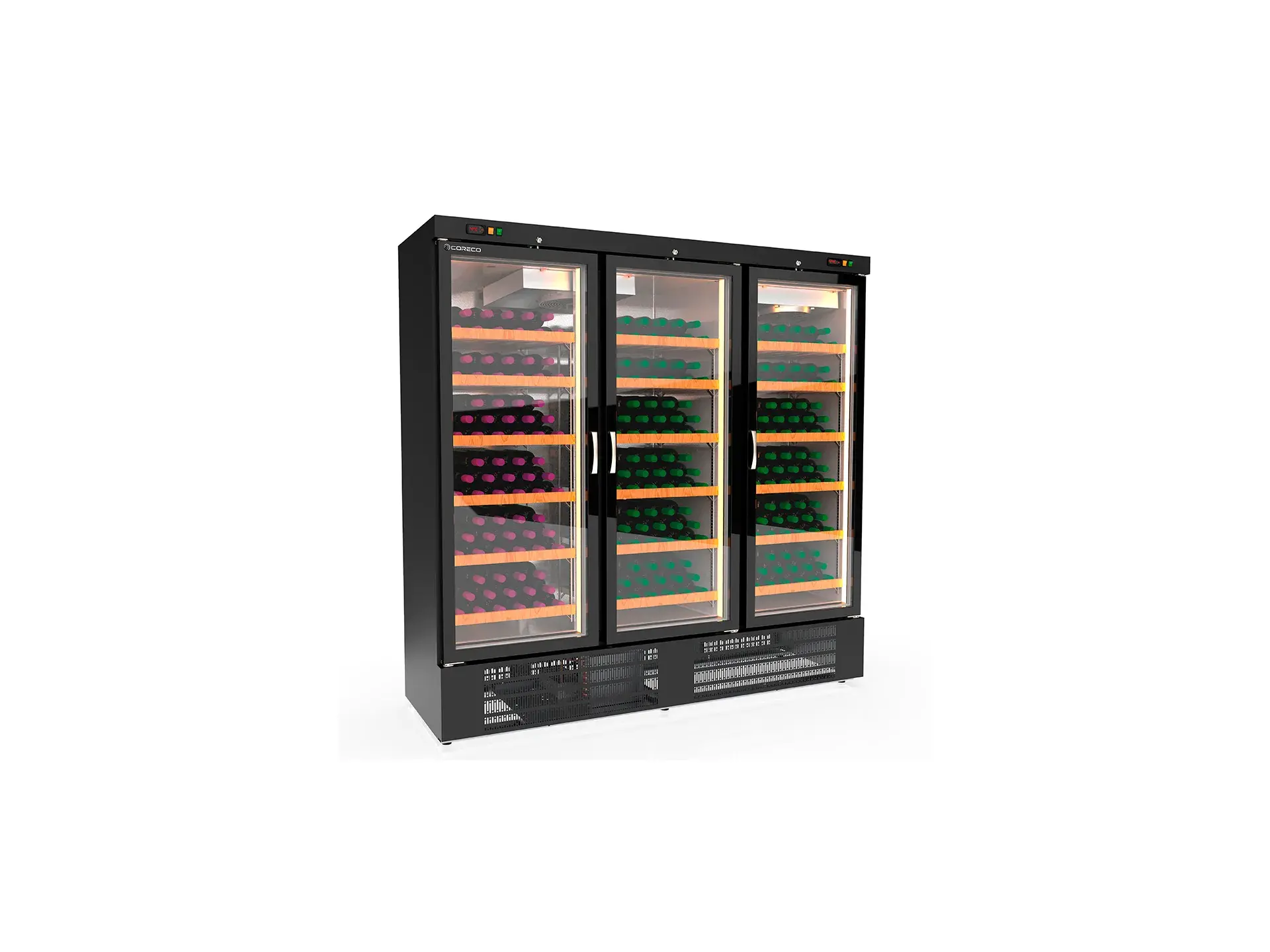
Characteristics of efficient refrigeration units
- Active humidity controlIt is important to prevent the corks from drying out and the wine from evaporating.
- Heating and cooling systemTo maintain a constant temperature.
- Pre-charged refrigerant gasEasy installation and maintenance.
- Anti-corrosion coatingIncreases the durability of the equipment.
- Electronic regulation with remote controlFor a more precise and comfortable handling of ambient conditions.
Looking for efficient refrigeration solutions for your wine cellar? At Coreco we offer a wide range of refrigeration units specifically designed to meet the needs of the HORECA sector. Our equipment guarantees the optimal preservation of your wines, ensuring that each bottle maintains its original quality and flavour.
Climate-controlled cellars and monitoring technology: the key to optimal wine preservation
- Use of air-conditioned cellarsThese modern "caves" are designed to maintain the ideal temperature and humidity throughout the year, regardless of the weather outside. Their structure and advanced insulation allow for stable conditions regardless of external variations.
- Monitoring systemsThe implementation of digital systems that monitor in real time the conditions inside the cellar, sending alerts if there are variations. Coreco's patented technology, the 'Master Ageing Controller', guarantees precise control of all parameters for optimum conservation. This system offers reliability, safety and absolute control, all within a neat design.
Better preservation of the taste of wine in refrigerated cellars
- Evolution of flavoursProper storage allows the wine's compounds to interact optimally, developing more complex and nuanced flavours. For example, a young red wine can acquire softer, rounder notes when properly stored for several years, while a white wine can develop greater complexity and richness in its flavour profile.
- Benefits:
- Development of complexityWines that are well stored can develop a wider range of flavours and aromas.
- Optimisation of ageingIt ensures that the ageing process occurs in a controlled and beneficial way.
- Benefits:
- Conservation of flavouringsMaintaining the integrity of the cork and preventing oxidation preserves the original aromas of the wine. This is crucial for fine wines, where aromas can be an essential part of the tasting experience.
- Benefits:
- Quality preservationThe delicate and complex aromas remain intact.
- Improving the tasting experienceConsumers enjoy wines that retain their original organoleptic characteristics.
- Benefits:
Economic and ecological aspects
- Energy efficiencySelecting efficient refrigeration units can significantly reduce operating costs and environmental impact. Coreco units are designed to maximise energy savings, resulting in lower electricity bills and a more sustainable operation.
- Benefits:
- Cost reduction: Less expenditure on electrical energy.
- Reduced environmental impactContribution to the sustainability of the business.
- Benefits:
- SustainabilityCoreco offers solutions that minimise the carbon footprint and promote environmentally responsible practices. Coreco offers solutions that minimise the carbon footprint and promote environmentally responsible practices.
- Benefits:
- Regulatory complianceComplies with the strictest environmental regulations.
- Positive reputationCustomers value sustainable practices and may prefer businesses that implement them.
- Benefits:
At Coreco, we are committed to providing solutions that are not only effective, but also environmentally friendly. Our refrigeration units are designed to maximise energy efficiency and minimise ecological impact.
Practical tips for the daily use of wine cellars
- Stock rotation: It must be ensured that bottles are rotated regularly so that they all have optimal storage conditions. This can be achieved by setting up a stock rotation system, where older bottles are placed at the front and new ones at the back. This simple method ensures that no wine is forgotten or stored too long, thus preserving its quality and taste.
- Benefits:
- Consistent qualityBy rotating the bottles, it is ensured that they all experience the same storage conditions.
- Loss reductionPrevents some bottles from deteriorating as a result of being stored for long periods of time without being used.
- Efficient inventory management: Facilitates more accurate monitoring of stocks and replenishment needs.
- Benefits:
- Equipment maintenancePreventive maintenance of refrigeration units is essential to ensure their efficient operation and prolong their service life. Scheduling regular checks and cleaning can prevent costly breakdowns and ensure that the units operate in optimum condition.
- Benefits:
- Durability of equipmentRegular maintenance prolongs the lifetime of the refrigeration units, protecting the investment made.
- Energy efficiencyWell-maintained equipment operates more efficiently, which translates into lower energy costs.
- SecurityReduces the risk of unforeseen failures that could compromise the quality of the stored wine.
- Benefits:
Proper preservation and refrigeration of wine is essential to maintain its quality and improve its characteristics over time. Choosing the right refrigeration unit, designed specifically for this purpose, ensures that optimum conditions are maintained at all times.
For an efficient use of wine cellars, it is essential to maintain regular cleaning and check the operation of all components. Organising the bottles properly and controlling both temperature and humidity according to the type of wine must be a constant. Inventory rotation and constant monitoring of internal conditions ensure optimal conservation.
It is also important to protect the wine from vibrations, light and odours, and to train staff in the correct handling of the wine cellar. Finally, regular technical inspections guarantee the proper functioning and longevity of the wine cellar.
Coreco: Refrigerated wine cellars for demanding environments
To find out more about our cooling solutions and how we can help you maintain the quality of your wines, feel free to contact us at Coreco - we're here to support your needs and ensure that every bottle of wine you serve is of the best possible quality!
